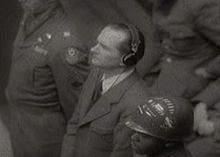None of the officers of the Wehrmacht division responsible for the tragic massacre in Ligiades ever had to take responsibility for their actions in front of the court. Their war crimes stayed hidden for a long time under the cover of the myth of the “noble Wehrmacht”, that presumably acted like any other normal soldier in a war.

In the 1948 trial of “generals in Southeastern Europe” Hubert Lanz, general of the mountain infantry in all Epirus, was indicted to 12 years of prison time, but not for the murder of civilians, children and women in Ligiades, but for the execution of hostages and captives in other parts of Greece. The Allies also searched for Karl von Stettner, commander of the 1. mountain infantry division, who was responsible for several other massacres. However, Stettner was considered missing in Serbia and later declared as dead. It never came to a trial.
The court was in possession of Lanz’s written order to take a “measure of atonement” in retaliation for Salminger’s death as evidence. Lanz was asked several times about the specific action in Ligiades, but every time he answered that he could not recall any of the brutal events having taken place.
Lanz was already released in 1952 from prison in Landsberg. As well as several other convicted during the trials in Nürnberg, John McCloy, at that time US High Commissioner for Germany, pardoned Lanz after broad public pressure in Germany.
The decision of the public prosecutors in Munich of 1951 that finally stopped the prosecution of Lanz on behalf of the murders in Ligiades states:
The case of Ligiades is about a mopping-up operation against a partisan village, during which course, the village, due to strafing, entirely or partially burned down and a part of the population died. If and in how far it was a matter of close combat, during which civilians were killed, cannot be determined in detail anymore nowadays.
Translated from: Feuerrauch. Die Vernichtung des griechischen Dorfes Lyngiades am 3. Oktober 1943, dort zitiert von StAMü 21131, Bl. 36
Witness statements, collected after the war, lead to the request to the department of public prosecution of Bonn of the “Office National Hellenique des Criminals de Guerre” (ONHCG) to take action against, among others, the commanders of the 1. mountain infantry division Major Hans Mayr and Wilhelm Stettner and Hubert Lanz. However, these preliminary proceedings of the public prosecution in Munich did not last long, the first one was stopped in 1960 and another one in 1968, with the explanation that the actions in Greece had already been discussed in Nürnberg / Nuremberg. That the murders of Ligiades had not been part of these discussions was not mentioned.
None of the people responsible for the massacre has ever apologized for the murders. Historian Meyer has asked several officers, active in the Wehrmacht at that time, but any statements were him denied. There is only a letter by Felix Bourier, a German sanitation soldier, who watched the attack from Ioannina and sent a letter to the village of Ligiades after the war, in which he apologized for the cruel murders.
Later in life, Lanz became a member of the German party FDP and advised them in military regards. After the rearmament of Germany, he tried to join the “Bundeswehr” (the German army), which, however, was prevented by the Americans. From then on he chronicled the actions of the 1. division of the mountain infantry between 1935-1945 and became honored member and president of the “Kameradenkreis der Gebirgstruppe” (Friendly circle of the mountain infantry). Until today, every year, the said association organizes a commemoration ceremony for the fallen and missed soldiers of the mountain infantry. However, since 2002, a counter-association called “Angreifbare Traditionspflege” (attackable cultivation of tradition) was founded and organized diverse campaigns to remember the involvement of the mountain infantry in war crimes, such as the one in Ligiades. As a success of this initiative one could mention that in 2010 the municipality of Mittenwald built a memorial for the victims of the mountain infantry. Furthermore in 2019, the “Kameradenkreis der Gebirgstruppe” and the organization “Angreifbare Traditionspflege” came to an agreement. Before each commemoration there has to be a bigger focus also on the bad aspects of the Mountain Division’s history. For example, a movie about war crimes in Greece was shown. Nevertheless, if one takes a look into the statue of the association “Kameradenkreis der Gebirgstruppe”, the war crimes are only mentioned in one single sentence. Memorials that are put up for the victims are not talked about and most of the 35 pages are about the great virtues of a soldier that is part of the mountain infantry.